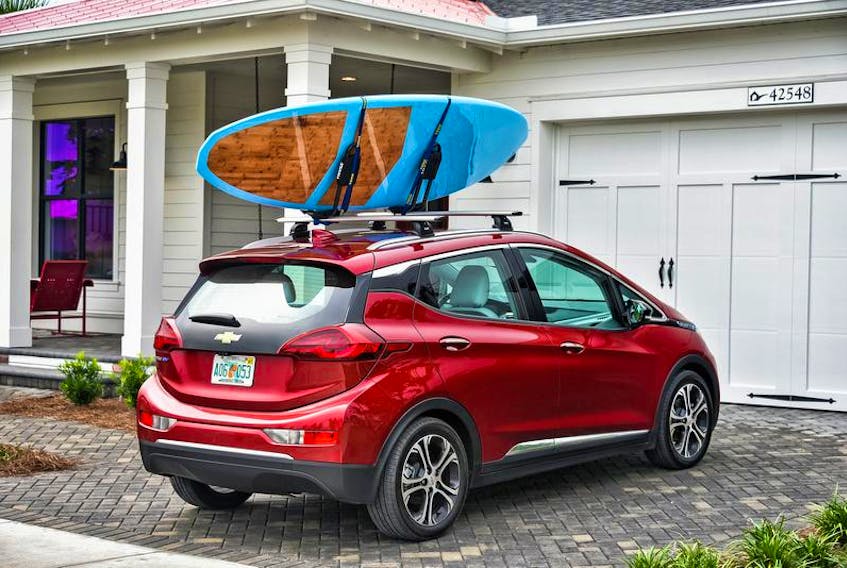It’s easy to rave about how fuel-efficient, cheap to operate and environmentally-friendly electric vehicles are – but are those statements really true? Here’s a closer look.
More efficient?
Electric motors are inherently more efficient at using energy than internal combustion engines. As well, battery electric vehicles (BEVs) and plug-in hybrids have highly efficient automatic or continuously variable transmissions, plus regenerative braking systems that recapture energy as they slow down the vehicle.
Add it all up and, according to Natural Resources Canada, electric drive systems are five times as efficient as conventional internal combustion engines and transmissions.
That helps explain why plug-in hybrids like the Chevy Volt, Honda Clarity or Toyota Prius Prime (when running in battery mode) or BEVs like the Chevy Bolt or Nissan Leaf get over three times the fuel economy of even the most efficient compact gas-engined vehicle. That’s worth repeating: three times the fuel economy.
Cheaper to operate?
So what does that mean in dollars and cents? How much does it cost to charge an electric vehicle, and how does that compare to a similar vehicle running on gas?
Let’s compare two similar vehicles, a 2018 Honda Civic and a 2018 Chevy Bolt BEV.
According to NRCan’s Fuel Consumption Guide, the Civic uses 6.6 litres of fuel per 100 kilometres. At $1.23/litre, that’s 8.1 cents per kilometre.
The Bolt uses 17.6 kilowatt hours of power to travel 100 kilometres. At today’s residential power rate, that’s 3.1 cents per kilometre, taxes included – less than half the cost of the Civic. If you have time-of-day rates, charging overnight will bring that down to 1.7 cents per kilometre — one-fifth the cost of the Civic.
That’s consistent with Natural Resources Canada: their research concludes that an electric vehicle costs two to three cents per kilometre to drive, versus eight to nine cents for a typical four-cylinder gas engine. Based on annual travel of 20,000 kilometres, that adds up to fuel savings of $1250 per year.
Fewer emissions?
“Sure, an electric car has no emissions — but now those emissions come out of the stack of the nearest power generating station.” It’s a commonly heard counterargument, and there’s some truth to it where power is generated from coal, oil or natural gas.
But the ‘greener’ the power your utility provides, the fewer the power plant emissions that are attributable to your electric car. And, as noted above, electric transportation is simply more efficient than conventional transportation.
All things considered, NS Power estimates that switching to an electric car in Nova Scotia reduces vehicle CO2 emissions as much as 50 per cent — a number that will get even better as we obtain more and more of our electricity from renewables.
As an advocate of sustainability, that’s an incredibly important factor for me personally. Reducing my own transportation carbon footprint in our rural region has long been a stubborn challenge, and my plug-in hybrid has enabled a huge reduction in my transportation carbon footprint.
What about manufacturing impacts?
It’s true that it takes more energy and resources to manufacture an electric car than a conventional one, mainly because of that big battery, but research indicates that is far more than offset by a lifetime of efficient, emission-free operation.
A 2015 Union of Concerned Scientists study, which measured emissions related to vehicle manufacture, use and eventual disposal, concluded that electric vehicles have half the emissions of conventional vehicles.
A 2016 Hydro Quebec life cycle analysis study, which measured all environmental impacts, not just emissions, concluded that electric vehicles have 55 to 80 percent less environmental impacts than conventional vehicles.
No doubt that province’s abundance of emission-free hydro power contributed to such an encouraging conclusion.
So, are electric vehicles really more fuel-efficient, cheaper to operate and environmentally-friendly? Based on the above analysis, the answers are yes, yes and yes.
And what about reliability, maintenance and year round performance? I’ll share everything I’ve learned over the past 12 months in Part Four.
Carl Duivenvoorden is a speaker, writer and sustainability consultant living in Upper Kingsclear, New Brunswick. @CDuivenv









